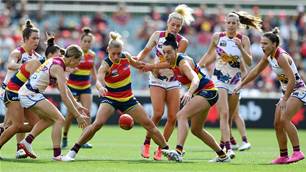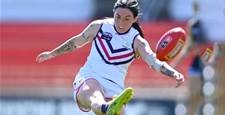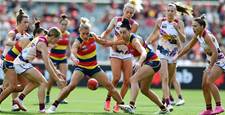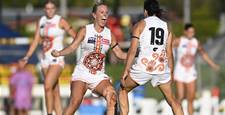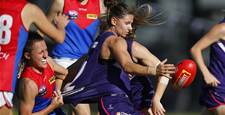The second annual AFLW Pride Game between the Western Bulldogs and Carlton is coming up this weekend, and it feels like a perfect opportunity to reflect on the AFLW’s relationship to its LGBTQIA+ fans and the game itself.
It sounds like a tired cliché but AFLW has offered a chance to watch footy to many who otherwise felt marginalised in this space, namely women and members of the LGBTQIA+ community.
Claire Flynn, a Carlton fan, tells me that she had completely given up on watching men’s footy.
“I couldn’t reconcile the abuses on and off the field around AFL and the wider football community,” she said.
“The rampant sexism, homophobia, racism, transphobia just meant it had nothing of value to me...That is [where I find] the value of AFLW and Pride games.”
Such a game makes for bittersweet moments.
Laura, also a Carlton fan, feels had she seen the inclusiveness of the match when she was growing up, “my journey as a young woman struggling with my sexuality may have been very different.”
“I never knew how much I needed women’s footy in my life until the inaugural AFLW match in 2017.”
Claire agrees: “The Pride Game matters because it sparks conversations, and it just reflects the point that people are queer and they play and support footy.”
Why this weekend's game has extra importance for @BriannaDavey.#BoundByBlue
— Carlton FC (@CarltonFC) March 12, 2019
Elisabeth Tuckey, the former CEO of youth homelessness non-profit charity Ladder and a Western Bulldogs fan, said that the game makes her “proud to be a part of such a wonderful club.”
She said when the club supported Hannah Scott to tell her story in the media before the inaugural Pride Game last year, it was a “pretty special moment... Scotty instantly became my favourite player.”
While some fans want to soak up all the football that they can get, others feel a lot more comfortable at AFLW games and only watch the women.
“There is a much warmer and supportive crowd [at AFLW games],” Claire said.
“The absence of angry/drunk/menacing people, usually men, hurling their frustrations at the game really does make for a more relaxed environment to enjoy the spectacle.”
“The AFLW has meant I have been able to encourage people who previously felt there wasn’t space for them to watch live sport and enjoy it.”
Fans are pragmatic about their clubs and the AFL, though. They’re aware they don’t always get it right, and there’s a long road ahead. Multiple Carlton fans I interviewed expressed disappointment at their club’s response to the 2017 same-sex marriage postal survey.
At the time, Carlton released a “statement” expressing their commitment to equality while respecting that “this is about personal choice”.
Most clubs, including the Western Bulldogs and St Kilda, along with the AFL, supported the Yes vote in media releases and actions. Laura was surprised that Carlton was chosen to be involved in the Pride Game after her disenchantment over this statement.
Similarly, some fans cannot fall under the all-inclusive spell of the Pride Game until the AFL changes its policy on trans athletes.
Their shifting requirements for trans women and non-binary people to be allowed to play in the AFLW, in comparison to state and local football, and their treatment of footballer Hannah Mouncey have hurt members of the community. It’s important to remember that for many, the AFLW remains alienating.
Alfie, who regularly attends AFLW games, says as a trans person, they understandably don’t feel comfortable getting excited about symbols like rainbow guernseys and flags while the AFL “is effectively barring trans women from playing.”
“I’m also wary about the huge amount of patting on the back that organisations like the AFL like to do around things like Pride games,” they said.
Second edition of the #AFLWPrideGame set for Sunday! 🏳🌈
— WesternBulldogs AFLW (@BulldogsW) March 12, 2019
📰 | https://t.co/SlWyT28rLn pic.twitter.com/cfxMA94Dvg
Another element to the match that some readers may not be aware of is that most clubs now have an unofficial or officially affiliated LGBTQIA+ supporter group.
I spoke to Ben Innella, Carlton Pride’s Events Manager, about what they do.
Like most Pride groups, their aim since 2016 has been to “provide a safe and inclusive environment” for members and allies. This has developed from being a “supporter group” to also providing support to its LGBTQIA+ members. Today, this entails sitting together at matches, as well as regular pre-game functions and attending events such as Midsumma.
“Carlton work well with our group in making sure they get our message across, that everyone... should feel safe and proud of who they are,” Ben said, noting in particular that gun forward Darcy Vescio has gone out of her way to help out where she can.
They are hoping to give back to the AFLW and sponsor a player from next season onwards.
Similarly, Bulldog Pride came together in 2017 when a group of fans realised they needed a “fun, inclusive safe space to watch the footy together”. Since then, it has grown from an informal social group to a formalised coterie supporter group of the club.

Committee member Connor Borchard-Burns said their “organising committee is deliberately diverse – we pride ourselves on magnifying the variety of voices and experiences that make up our community.”
She stresses that the club has taken a vested interest in the group, which has been positive for the members to see.
“They see firsthand that the club they’ve loved and been a part of values them as fans and as people,” Connor explains.
“The Pride Game, in particular... the club has worked with us, and members of our community, to undertake meaningful consultation and taken real steps to make the game genuinely inclusive and accessible – like providing gender neutral toilets and ensuring members of the community feel safe.”
Similar to Carlton Pride, they host social events at women’s and men’s matches, as well as a Grand Final brekkie for the AFLW (although their team won’t be playing!) and attending club events like Family Day to “grow the rainbow wave for the Dogs.”
The AFLW Pride Game is this Sunday at Whitten Oval, at 4.05pm. Both Pride groups will have membership and merchandise stalls at the match and are forming a guard of honour for the players at the beginning of the game.
Let’s hope it’ll be a closer one this year!
Related Articles
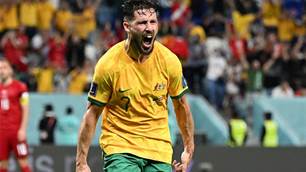
Socceroo star's message to kids: Don't be an AFL player
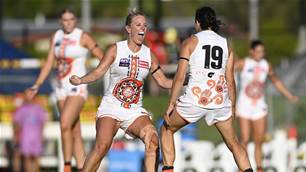
Updated: AFLW Round 2 preview and schedule
